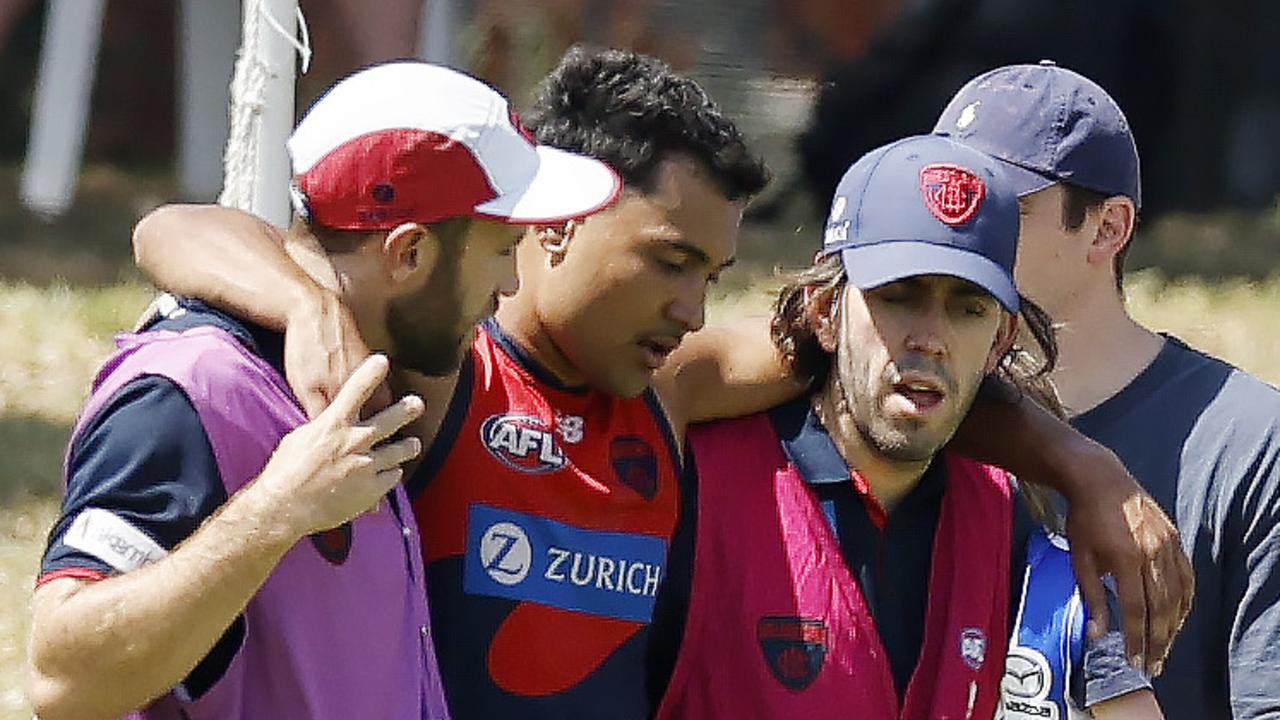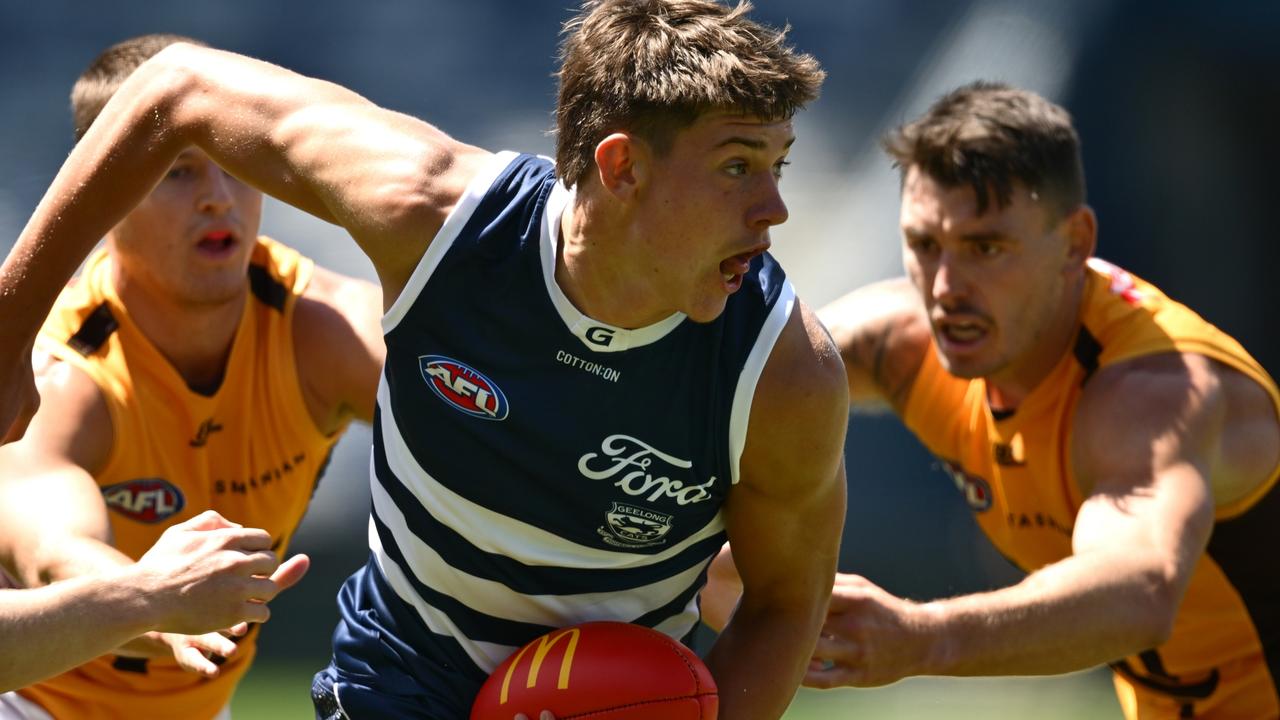Mick Malthouse believes AFL careers might end sooner as clubs manage older players
Mick Malthouse always ignored birth certificates when picking his best teams. But the premiership coach writes with rule changes and a faster game, the longevity of a player’s career is being compromised.
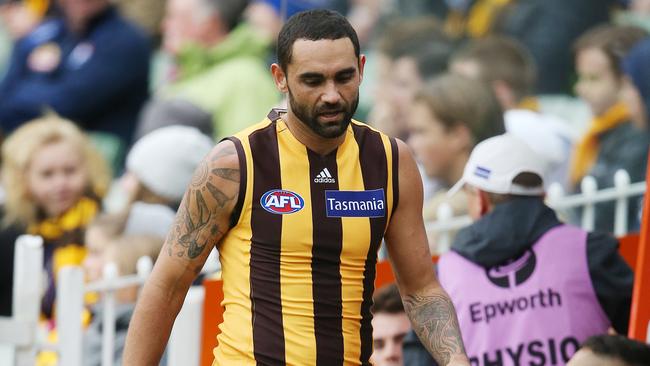
AFL News
Don't miss out on the headlines from AFL News. Followed categories will be added to My News.
I always picked a side with the mantra “throw out the birth certificate”.
If a player is good enough to fit into your best 22, no matter how young or old he is, then pick him.
A player is kept on a list, whatever his age, because the selection committee believes, when fully fit he is potentially part of the best team.
MONEYBALL: BLUES WINNING STOCKER TRADE
SPEED MACHINES: THE AFL’S FASTEST MEN
But for some players, when the niggling injuries that are a dreaded sign of an ageing body appear, and their pace and durability is affected, it can be the start of a downward slide. And it can begin to compromise the team. It becomes about managing that player.
And I’m noticing lately that the age at which this is occurring is getting younger by the season.
The longevity of a player’s career is being compromised and I’m wondering if 30 is the new 33.
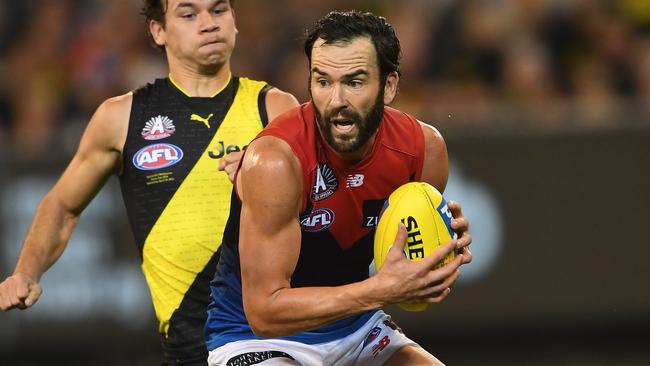
Some new rules in recent years haven’t been kind to “older” players.
Reduced rotations have meant less of a break on the bench; the 6-6-6 centre bounce set-up prohibits slower players from being in the square; and even the behind kick-in rule disallows for a break in play.
The game appears faster, players with unprecedented strength are hitting harder, and the tackle technique is at its best ever. It all takes a toll and older bodies, in particular, are suffering.
Several big names — Shaun Burgoyne and Aaron Sandilands (both aged 36); Jarrad McVeigh and Daniel Wells (34); Jordan Lewis (33); Lance Franklin, Heath Grundy and Brett Deledio (32); Grant Birchall, Lynden Dunn, Hayden Ballantyne and Robbie Gray (31); James Frawley (30); Matthew Kreuzer and Stephen Hill (29); Charlie Dixon and Dan Hannebery (28); Jake Carlisle (27) are on the sidelines or battling to play senior footy.
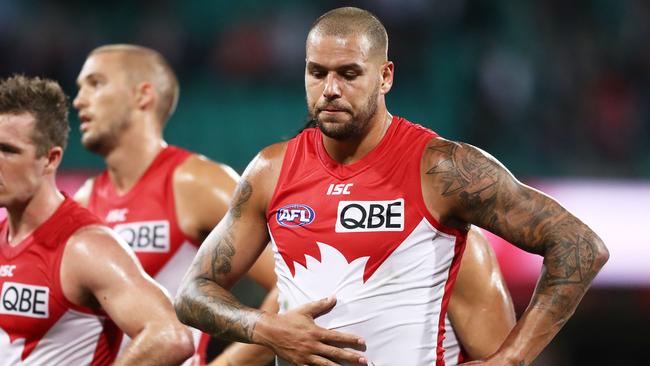
The above group is not a bunch of battlers. A swag of premierships, All-Australian and best and fairest honours are among them.
Ageing stars with good game value become an entity of their own at a football club, by requiring a management program. If your team is winning, it is a luxury to “rest” players. If you’re chasing your tail, then a program like this becomes a nightmare.
The luxury of “resting” players diminishes with each loss early in the season.
Melbourne can’t afford to rest a single player. If he’s in the best 22 and isn’t injured he has to play because the Demons desperately need to start stringing wins together.
With its defeats mounting, West Coast is under extreme pressure and needs Nic Naitanui back in the team, quick smart. And while it would be beneficial to rest Josh Kennedy to save his body, coupled with Jack Darling’s poor form, a lot falls on Kennedy’s shoulders and he can’t score from the stands.
If Sydney is any chance of making the finals, it needs Franklin back in the side for the rest of the season. The Swans just don’t score without him.
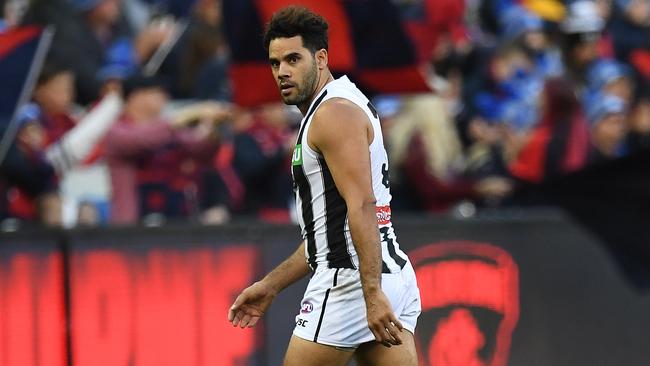
Port Adelaide is on the cusp. With its best side on the field it is good enough to make the final eight, without it, probably not. I can’t see Paddy Ryder being rested this season. Charlie Dixon, on return, will need to be carefully managed.
And this is where the problem lies. The team the coach wants is sometimes compromised to think long-term when it comes to an ageing or injury prone player. You end up second-guessing yourself with game time versus “rest” time. Can we get away with playing him for 65-70 per cent of the game? Can we rest him for a week? All for the longevity of his career.
But when immediate results are required for the club, those plans go out the window.
At the other end of the scale, Geelong with five wins and one loss can afford to give players the week off. It is already looking after its talented younger crop — resting Charlie Constable and Jordan Clark in recent weeks — and now there is talk of resting Gary Ablett too.
It is good policy and the Cats are doing it well. They can because they are a game clear on top of the ladder.
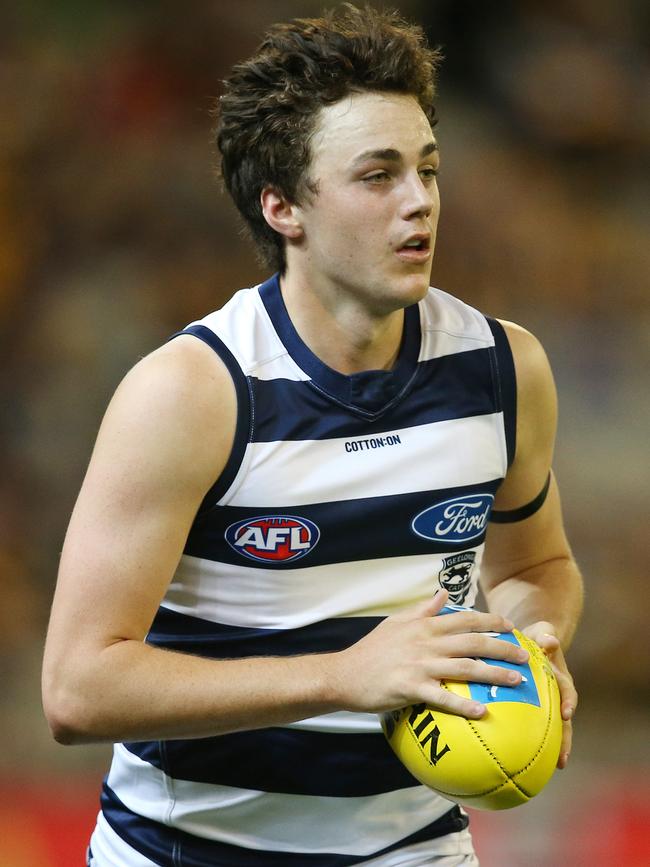
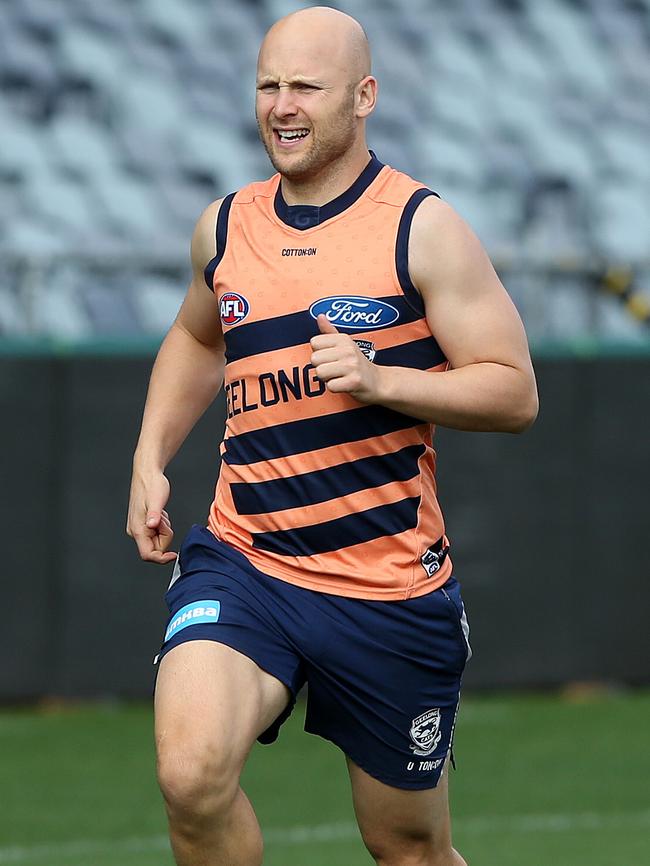
Collingwood has afforded to give Wells more time to come back from injury and gave Ben Reid a run in the reserves which has paid dividends with his return this weekend.
The players most vulnerable to “ageing” early in the current footy climate are players who lose pace to niggling injuries.
In a stop-start, mark, kick, mark, kick game, it’s OK. But when they come up against a running team, they can’t go the extra yard they once did.
And that is when it becomes a burden.
Players like Lewis, Gray, David Armitage, Hannebery, Ballantyne, Bryce Gibbs, Burgoyne, Matthew Suckling and Richard Douglas are all in this category.
Losing just a little bit of pace makes them highly vulnerable to being shown up with the current speed of the game. If they are in and out with injury also, they are clawing for consistency and can lose confidence and perhaps start to wonder if the red light is flashing for their career end.
It is horrible for the player, but inevitable.
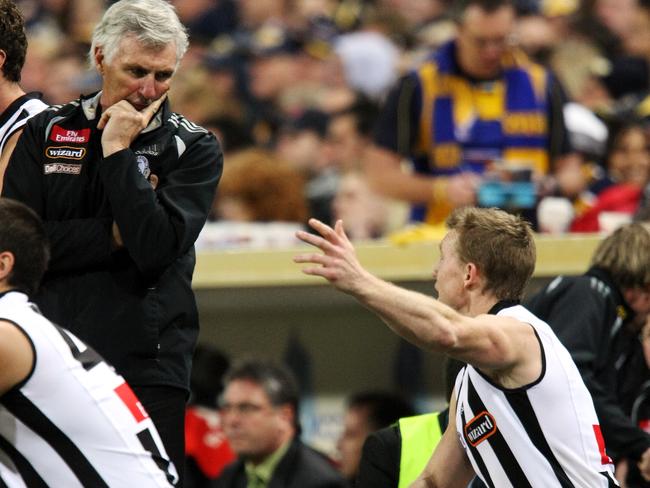
One of my greatest ever players, Nathan Buckley, became prone to hamstring problems in the latter part of this career. He was a dominant player still, but he began to go to ground more often to chase the ground ball.
He still had the intensity and determination from early career, but like so many older players with natural body degeneration, Buckley threw himself at the footy, instead of keeping his feet, and lost some of his effectiveness.
I’m so glad we saw a champion of the game leave at the right time instead of playing for a year or two too long.
I’ll never forget seeing my Richmond teammate Royce Hart jeered as he walked around the boundary at the end of his illustrious career, the football public having forgotten the great player he had been, when he was still able to reach the high demands he put on himself.
History tells us that if a player can hold his pace then his experience will get him through. But, if he loses speed, no matter how good his footy brain is, time is against him.
It happens to the very best of them. Remember Wayne Carey at Adelaide?
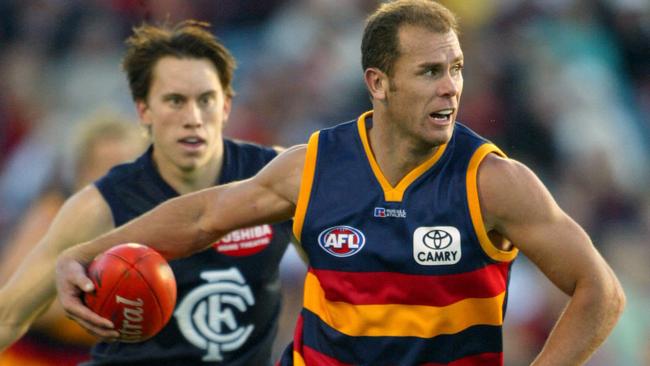
Some players in their 30s don’t miss a beat. So often, these are players who weren’t quick to begin with so they can maintain their pace. Players like Scott Pendlebury, Joel Selwood and Sydney’s Josh Kennedy. Champions, all of them.
And of course there’s the exception to the rule, the player who just keeps on keeping on, like Brent Harvey, who probably had his career terminated a year too early at the age of 38.
The likes of Travis Boak, Justin Westhoff, David Mundy, Dale “Daisy” Thomas, Isaac Smith, Heath Shaw, and Ablett in a breakout year, are a few defying the odds.
As our game evolves we are constantly negotiating new territory. Unfortunately, it is not always going to be to the benefit of the players.
You would genuinely love to hold on to all of your players, but when they are no longer able to take to the field on a regular basis … tick, tick, tick.
I just fear that the time bomb will start to explode earlier and earlier on some players’ careers.
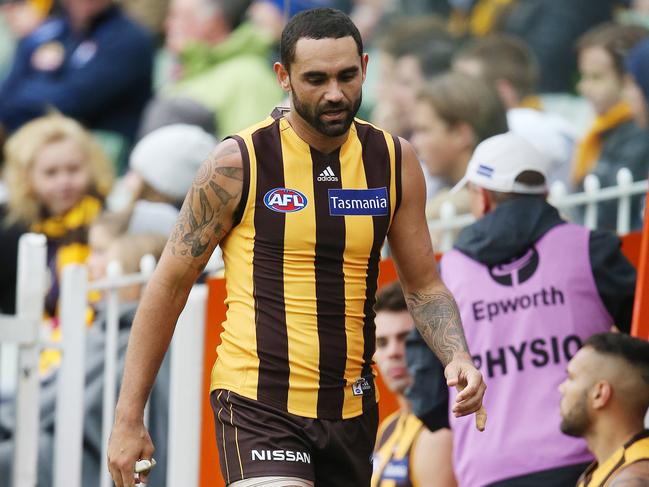
FIGHTING FATHER TIME
* Players aged 28 or older who are sidelined through injury or have missed chunks of AFL matches this season
Yet to play: Aaron Sandilands, Stephen Hill (Frem); Daniel Wells, Lynden Dunn (C’wood); Dan Hannebery, David Armitage (StK); Charlie Dixon (Port Adel); Dale Morris (Bulldogs); Grant Birchall (Haw, last played R15, 2017).
Others to miss footy through injury: Shaun Burgoyne (Haw, injured in R2 and returned yesterday), James Frawley (Haw, injuredin R4); Jarrad McVeigh (Syd, injured in R3), Heath Grundy (Syd, missing since R1), Lance Franklin (Syd, out for past two matches); Jordan Lewis (Melb, missed opening four rounds); Brett Deledio (GWS, not seen since R2); Hayden Ballantyne (Frem, injuredin R1); Robbie Gray (Port Adel, will miss matches with broken hand); Matthew Kreuzer (Carl, missed first four rounds and injuredagain); Matthew Suckling (Bulldogs, injured in R4); Richard Douglas (Adel, injured in R1).
Originally published as Mick Malthouse believes AFL careers might end sooner as clubs manage older players

